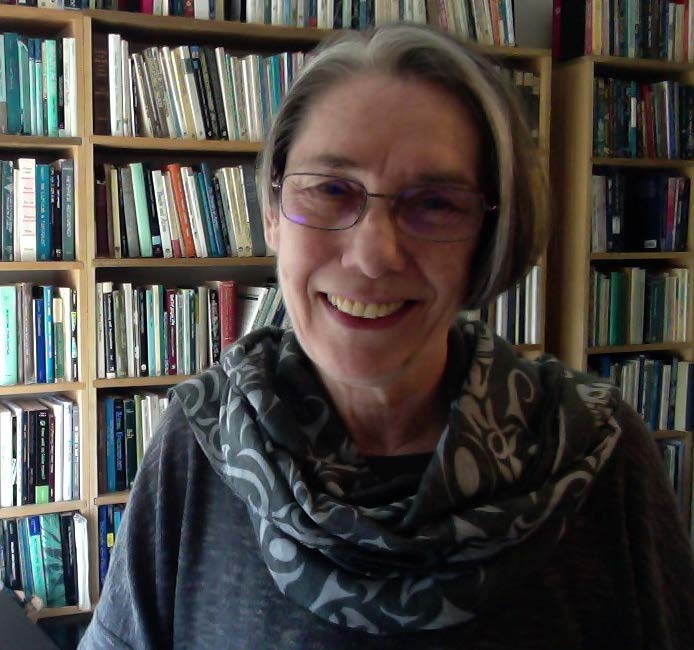Letter from Outgoing PSA President, Alison Wylie

Outgoing President’s Letter (2019-2020)
Alison Wylie
24 January 2021
This has been a challenging two years for the PSA; we knew we’d have to navigate several major transitions that somehow all coincided, and then the pandemic upended carefully laid plans for PSA2020. I first want to thank the Governing Board and Officers, the members of several heavy-lifting committees we formed to address these issues, our outgoing Executive Director, Jessica Pfeifer, who played a crucial role in steering us through multiple planning sessions and searches, and also several of my predecessors: past presidents of the PSA who, with Jessica and the members of their Governing Boards and committees, laid the foundations for what seem, in retrospect, nothing less than miraculously positive outcomes for the PSA on all fronts. You’ll find some of the details in the Tribute to Jessica Pfeifer (forthcoming), and you’ve heard quite a lot about them in PSA news and announcements over the last two years; this reprise cannot possibly do justice to the vision and hard work that’s gone into realizing them – much of which predates my term. To put this in context, I take as a benchmark for what we’ve accomplished the recommendations set out fifteen years ago in the report of a PSA Advisory Committee led by Elliott Sober.
At PSA2004 the Governing Board charged Elliott’s Advisory Committee with “formulating recommendations…on a variety of topics”: Michael Dickson, George Gale, Sandy Mitchell, Mary Morgan, Miriam Solomon and I served on this committee. Here are some highlights, as reported the following year.
The first was that the PSA should consolidate its “on-line services”; the PSA newsletter, webpage, voting polls, as well as the conference submission and review process should all be hosted centrally, and should include a “webpage clearing house” to support PSA members “participating in public discourse about the nature of science, scientific evidence, and science policy.” Another had to do with PSA’s “business organization”: at the time there was no consensus on the question of whether the PSA should continue to rely on the HSS for administrative support and conference arrangements, or establish its own business office and run its own meetings. There was also no consensus on whether the PSA should host annual rather than biennial meetings, but the committee suggested that, if the PSA continued to meet biennially, it might consider sponsoring topical meetings in the off-years. There was, however, consensus that the PSA should compare bids for publishing Philosophy of Science from a range of presses when the University of Chicago Press publishing agreement came due, with the aim of negotiating stronger support for its membership services and a better deal overall. To ensure that issues like these would be addressed, the committee recommended that the Governing Board meet every year, not just biennially, and that the PSA commit financial support to the Executive Secretary with an eye to recruiting someone who could lead a strategic planning process.
When Helen Longino stepped into the role of PSA President in 2013 progress was being made on some of the issues flagged by the 2005 Advisory Committee, and several others were coming to a head. While Helen was Vice President she was party to recruiting Jessica Pfeifer as Executive Secretary, a precursor to the current position of Executive Director, and, in the course of her term as President, she took major steps to further the consolidation of the PSA’s business organization, as recommended by the Advisory Committee. With the journal publishing contract coming due, she and Jim Woodward reviewed proposals from several presses, and negotiated an agreement with the University of Chicago Press that has sustained the PSA since 2012. Helen and Jessica put the PSA on a much firmer financial footing, which has made it possible to pursue a path toward autonomy and build an expansive set of initiatives that have transformed what the PSA is and does as a society. In the course of Ken Waters’ and Sandy Mitchell’s presidencies the PSA took over the administration of its business operations from the HSS; the hard-working Governing Board now meets twice between biennial meetings; and, in the process, the role of the even harder-working Executive Director has expanded exponentially. The PSA sensibly stuck with biennial meetings, but has expanded their scope dramatically since 2012, with cognate society sessions, the poster forum and public forum, and a rich offering of more informal meetings and receptions, as well as onsite childcare and dependent care subsidies, travel grants for early career international scholars – all designed to make PSA meetings more welcoming and inclusive.
This past December Jessica’s impressive eight-year term as Executive Director was set to end, and the publishing agreement with the University of Chicago Press was again up for review. I found myself retracing Helen’s steps, setting up committees to oversee a journal publisher search and manage the Executive Office transition at the start of my term. With these two major tasks in prospect, I declared a moratorium on new initiatives and convened a strategic planning session at the first Governing Board meeting I chaired in May 2019. Here’s a summary that I hope will give a sense of how all these moving parts are interlinked and how they fulfill a vision for the PSA that was already taking shape in 2005 when Elliott Sober’s Advisory Committee delivered its report; it is striking, in retrospect, how prescient the recommendations of this committee have been.
 Philosophy of Science Publisher Search
Philosophy of Science Publisher Search
This is a volatile time for journal publishing, as I’m sure you’re well aware, so we sought advice from a number of sources. Especially helpful was Raym Crow of the Chain Bridge Group, a publishing consultant with particular expertise in “sustainability strategies for non-profit publishers.” We solicited proposals from a number of presses, including the University of Chicago Press, and undertook a process of systematically reviewing our options, as Helen and Jim had done. The half-dozen offers we received testify to the stellar reputation of Philosophy of Science. All were compelling in their different ways, but the proposal from Cambridge University Press stood out for its Open Access provisions, something we deemed crucial in the current journal publishing environment. Thanks to Andrea Woody who, as Editor-in-Chief, advised on journal priorities throughout, and to Jessica Pfeifer for her careful appraisal of the logistical implications of all the offers we received, especially where membership management is concerned. Thanks, too, to committee members Hasok Chang, Sabina Leonelli, and Michael Weisberg for the enormous amount of work they put into the search process, and for the depth of experience and wisdom they brought to bear in our assessment of the diverse options we considered.
Membership Services
The publisher search process pushed us to reassess how we handle membership, a service University of Chicago Press had been providing the PSA. Although several of the publishing proposals we received included a provision for membership services, in most cases they were third-party and didn’t measure up to what, for the same cost or less, a new generation of dedicated membership management platforms can now provide. Jessica identified a number of options that would allow the PSA to manage its own membership going forward – another crucial step toward autonomy – and initiated the transition to MemberLeap, the system she settled on. This won’t be complete until the journal moves to CUP at the end of 2021, but it is already changing how we handle event registrations and much else.
 “On-line Services”
“On-line Services”
The decision to move Philosophy of Science to CUP and take over our management of our membership has had another immediately visible effect; it catalyzed a complete overhaul of our website – the one on which you’re reading this letter. This promises to further realize the ambition of consolidating all the key functions of the PSA online and, in addition to keeping members up to date on PSA business and supporting PSA meetings, it hosts online collaborative work spaces for the Governing Board and PSA committees – just the kind of functionality needed for the PSA website to serve as a dynamic version of the “webpage clearing house” envisioned by the 2005 Advisory Committee.
Jessica Pfeifer deserves special thanks for taking on the development of this new website, with incoming Executive Director Ryan Feigenbaum, in the last months of her directorship. She had made it a priority, when she stepped into the role of ED, to develop the website that has served us since 2008; making this significant upgrade a priority as she steps down is a parting contribution to the PSA from which we will benefit for some time to come.

Executive Office and Executive Director Search
The committee charged with finding the PSA a new institutional home was also tasked with re-envisioning the role of the Executive Director and the PSA Executive Office. It was clear by the time I joined the Governing Board four years ago that the demands of the Executive Director position had vastly outgrown the model we had been working with; even with expanded support, as recommended by the 2005 Advisory Committee, it was no longer tenable for an Executive Director to manage PSA business alongside a full-time faculty position. At the 2019 strategic planning meeting the Governing Board wrestled with the question of what arrangement might work better, and how to deliver a solution by December 2020 when Jessica’s term as Executive Director would end and, with it, the agreement to host the PSA Executive Office at her home institution, the University of Maryland, Baltimore County.
We started the process by taking stock of how academic societies in related fields and of similar size manage their business and administrative functions. Especially helpful in this connection were summaries of organizational options developed by Hasok Chang and, with Jessica Pfeifer and Sandy Mitchell’s guidance, by Luma Consulting, a group that advises non-profit organizations on exactly the issues we were facing. We learned that societies like the PSA manage their business in widely different ways, so we decided to run an open-ended search, encouraging those interested in hosting or directing the Executive Office to propose their own distinctive models for managing the affairs of the PSA.
Initially this search seemed to be off to a worrisome start, with a number of colleagues reporting that their university administrations could not countenance taking on the additional commitment of resources – space, personnel, funding – associated with hosting the PSA Executive Office. In the end, even though COVID-19 foreclosed some initially promising possibilities, the search brought us several compelling proposals. The Governing Board enthusiastically endorsed the proposal we received from the University of Cincinnati: the Center for Public Engagement With Science (PEWS) and the UC Philosophy Department will host the PSA Executive Office for the next five years, with impressive support from all levels of the UC administration and from the Taft Foundation. A major innovation here is that the role of the PSA Executive Director is now structured as 75% of a dedicated professional position, with the complementary 25% committed to the role of Program Director in PEWS.
With the University of Cincinnati host agreement in place, we then embarked on the search for Jessica’s successor and, again, made this an open-ended search. We were looking for an Executive Director who combines expertise in philosophy of science with experience managing non-profit organizations, but we were open to considering applicants who balance these requirements in quite different ways. Our advertisement of this position attracted a stellar pool of applicants whose diverse skills and interests helped us conceptualize the role of the new Executive Director in a reconfigured Executive Office. The outcome, as announced last October, is that we were delighted to recruit Ryan Feigenbaum for this position. He is a philosopher and historian of science by training who served for several years in the Executive Office of the HSS. He brings to the PSA considerable non-profit management expertise as well as, among other things, a suite of web-based skills that can be counted on to expand our reach as we do ever more online.
Special credit goes to Angela Potochnik who, as Director of PEWS and member in UC Philosophy department, was the chief architect of the proposal that convinced us to move the PSA Executive Office to the University of Cincinnati. She played a pivotal role helping us navigate the complexities of negotiating a five-year host arrangement with the University of Cincinnati in the midst of the pandemic, and then chaired the search that brought us Ryan, who took up the position of PSA Executive Director at the first of January.

PSA Meetings
Despite my moratorium on new initiatives, some have been unavoidable – and that’s all to the good. COVID-19 challenged us to rethink the timing of PSA2020 and reinforced a growing sense of urgency that, given the global climate crisis, the PSA must revisit the questions raised in 2005 about the format and frequency of our meetings. We got tremendously helpful feedback from some 570 PSA members when we ran a survey asking you about the options we were considering for PSA2020 last Spring. Your advice then and, we hope, in response to future requests for advice, will be invaluable to the PSA Biennial Meeting Planning Committee, chaired by John Dupré, that will be canvassing options and preferences for future PSA meetings.
Warm thanks to the PSA2020 Program Chairs – Angela Potochnik, Program Committee Chair; Cailin O’Connor, Poster Forum Committee Chair; Nancy Nersessian, Cognate Societies Coordinator; and John Bickle, Public Forum Committee Chair – for weathering all the challenges of reorienting their plans for the 2020 biennial meeting, now scheduled for November 2021. One positive outcome is that, with the aim of maintaining continuity, several inter-meeting events have been scheduled online:
- Putting COVID-19 in Its Place, a webinar moderated by John Dupré and hosted by the PSA in November 2020;
- PSA Poster Forum, an online presentation of posters accepted for PSA2020 scheduled for three Fridays this January and February.

Climate Change Taskforce and Sustainability Committee
Directly related to future meeting planning, this new initiative is one of the most consequential steps we’ve taken in forward-looking strategic planning for the PSA in the last two years. The impetus for creating this task force was inquiries from PSA members, especially Kerry McKenzie, who now serves as its chair. She and her committee were instrumental in advising the Governing Board on its recent commitment to adopt the Sustainability Guidelines recommended by the Philosophers for Sustainability, and they are now exploring ways in which the PSA can implement these guidelines. I am working with Kerry and the Task Force on plans for a President’s Symposium at PSA 2020/2021 that we envision as a PSA Forum on Climate Change.
Equity, Diversity, Inclusion
In response to the Black Lives Matter protests last summer, an ad hoc collective of Governing Board members developed a statement on “Police Violence and Black Lives Matter” as well as a “Commitment to Antiracism, Diversity, and Inclusion.” Together these call on the PSA and its members to find ways in which we, as philosophers of science, can address systemic oppression at a societal level, and redouble our efforts to address issues of equity and inclusiveness in the PSA.

Several important equity, diversity and inclusion initiatives of the PSA that are already in place are thriving. UPSS (Underrepresented Philosophy of Science Scholars) is responsible for a cluster of programs dedicated to addressing the problem of underrepresented groups in philosophy of science, and has seen its mentoring program go from strength to strength. They will be sponsoring an UPSS Session at PSA2020/2021, and providing travel support for early career scholars (students and recent graduates) to attend this meeting as UPSS Delegates. In addition, UPSS took the lead this past summer proposing a PSA Prize in Philosophy of Science and Race which was recently approved by the Governing Board. Special thanks to Alisa Bokulich as chair of UPSS, and the dedicated members of the UPSS committee for the work they’ve done on all these fronts.
On the advice of the Diversity and Climate Committee, the Governing Board has also endorsed the creation of an Ombud Committee and Duty Officer to support implementation of its meeting conduct policies at PSA2020/2021. In the spirit of ensuring that our meetings are accessible, welcoming, and inclusive for all philosophers of science, Hasok Chang deserves special thanks for serving as the inaugural chair of an International Relations Committee, created in 2019 with the objective of encouraging philosophers of science from around the world to participate in the PSA.
A prerequisite for everything the 2005 Advisory Committee recommended and for all that has come since, has been to put the PSA on fiscally sound footing – a mandate that has been a priority for Jessica since her term as ED began (see Helen’s tribute to Jessica) Going forward it is crucial that the PSA not only be well enough funded to support ongoing programs, but that it have the depth to weather tough times and rise to challenges, with room to grow and explore new possibilities. This is especially crucial at this juncture; the world of academic societies, like that of journal publishing, is under enormous pressure to reinvent itself, a message that was reinforced at every turn as we negotiated the publishing agreement for Philosophy of Science and worked through the details of how the PSA Executive Office might best be structured. I particularly thank two new Officers of the PSA who have taken up their roles in the last two years with responsibility for our fiscal well-being, and for maintaining our collective memory.
Kevin Zollman, PSA Treasurer, was recruited by Sandy Mitchell and appointed just as my term as PSA President started. He has been responsible for developing a program of fiscal stewardship for the resources we have, and establishing a practice of financial planning predicated on the principle that any new initiatives proposed to or by the GB should come with a plan for raising new funds to sustain them.
Chris Haufe, PSA Secretary, was appointed this last year, and is charged with keeping our records in order, crucial for an organization that is now as long-lived and complex as the PSA.
Stepping down as President at the end of my two-year term, I’m optimistic that the PSA will not just survive adversity, but thrive – that incoming President John Dupré and Vice President Michela Massimi, the stalwart PSA members who serve on the Governing Board and committees, and everyone connected to the PSA, will find creative ways to build on the transformative fifteen years initiated, in many ways, by Elliott Sober’s 2005 Advisory Committee.